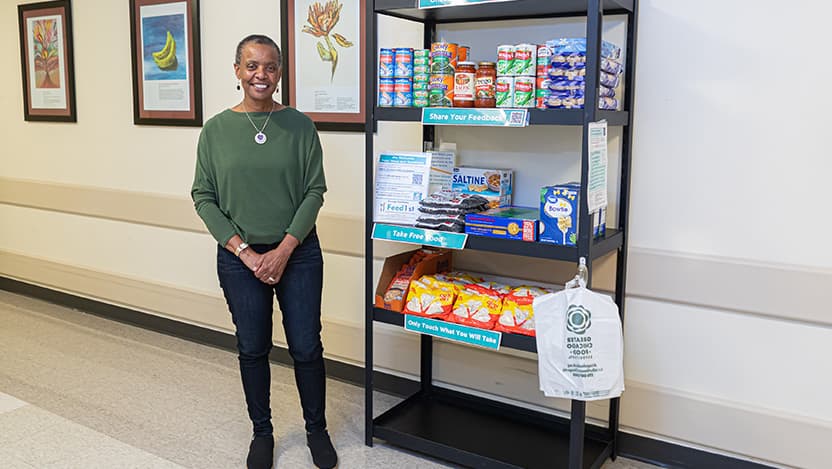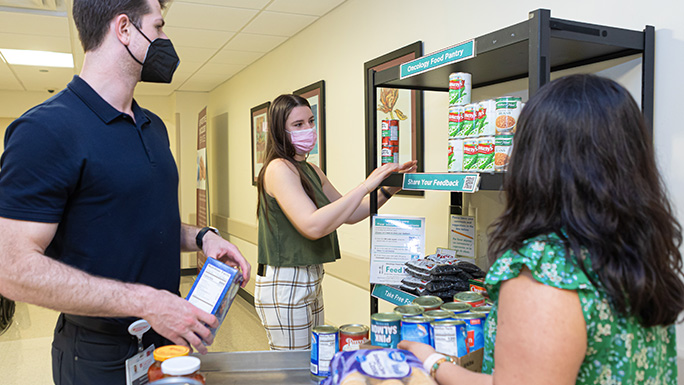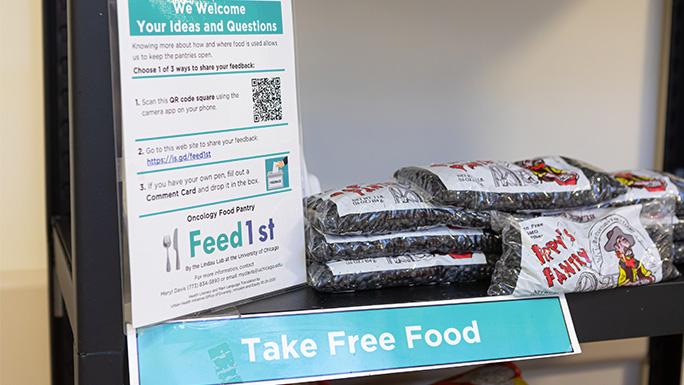Making hunger one less challenge to deal with

There is no good time for a cancer diagnosis. But for families already struggling with multiple challenges, including having enough food to eat, a cancer diagnosis can tip a precarious situation into a full-blown crisis.
Five years ago, Ann Jackson, DPT, MPH, saw this firsthand as she sought treatment for breast cancer at the University of Chicago Medicine’s Infusion Therapy Suite. Jackson, then a first-year fellow at the MacLean Center for Clinical Medical Ethics, was struck by the extreme practices some of her fellow patients adopted, such as skipping meals to pay for parking.
“I was wanting there to be kindness and hope for everyone, but I recognized there were gaps and that people had needs that were going unmet,” said Jackson, a physical therapist and member of the Cancer Services Patient & Family Advisory Council at the University of Chicago Medicine Comprehensive Cancer Center.
After attending a lecture by Duchossois Center for Advanced Medicine in the Infusion Therapy Suite area. It's the same as when it opened in 2017: four shelves stocked with healthy foods, from canned vegetables and soups to dried oats and peanut butter. The food is supplied by the Greater Chicago Food Depository. Depending on the time of year, vegetables from the Parking Lot B rooftop garden also are available.

Social workers connect with pantry volunteers to help identify patient and families who could benefit from the service. But the pantry is self-serve and open access for all: Anyone in need can use it and no vouchers or documentation are required. This, like all Feed1st Program pantries, is by design. Too often, Jackson says, those seeking help are sidelined by the forms and required travel that is baked into an approval process.
“We wanted something discreet, dignified and easy,” said Jackson, who has since started the started individual complimentary nutrition stations at the Flossmoor, Tinley Park and Harvey locations.

“The need for these pantries grew during the pandemic,” said Mellissa Grana, Feed1st operations lead and a research associate in the Department of Obstetrics and Gynecology. “We added five new pantries at our Hyde Park Campus during the pandemic and are distributing more food than ever before.”
As for Jackson, she continues to help with the oncology department pantry, inspecting it every time she visits the cancer center for her own care and requesting keys to the storage room so that she can restock the shelves.
“If we believe that food is medicine and that people need nutrition to restore tissue and regain health – or even just to feel better about being able to provide for their families – isn’t this worth it?” said Jackson.
You can donate to Feed1st here, and sign up for the Feed1st The supportive oncology program offers a range of helpful services for cancer patients and their families, including mental health care, nutrition counseling, social work support and more.
Helping You Cope With Cancer
